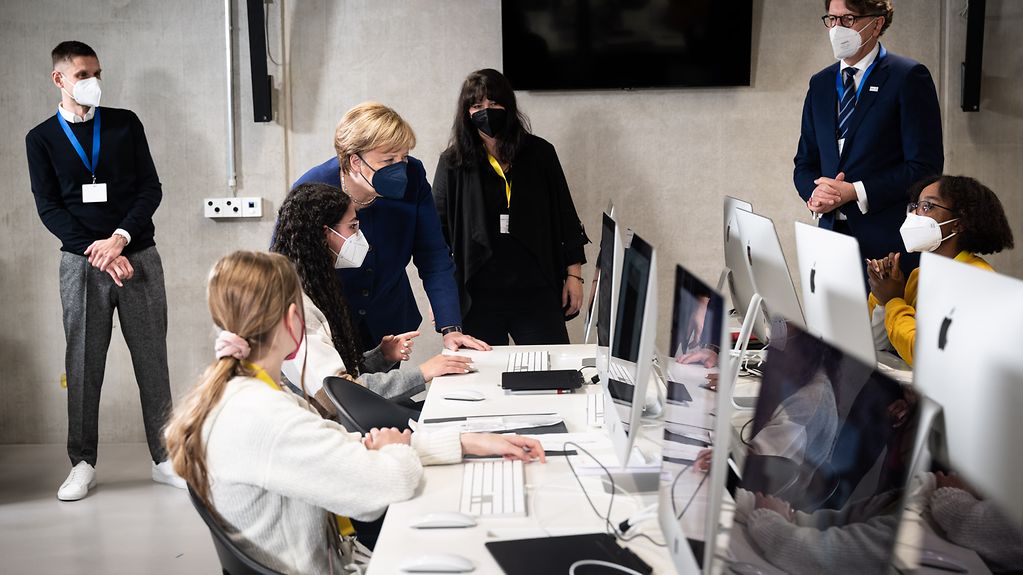Digital education
The digital transformation is bringing about rapid, fundamental change to the way we live, work and learn. This is why it is particularly important for children and young people to learn how to use these technologies at an early age. A fine example of this is TUMO, a digital learning centre in Berlin which the Federal Chancellor visited.
2 min reading time

The TUMO centre offers free learning opportunities for young people aged between 12 and 18 – from programming and robotics to music production, animation, photography and graphic design.
Photo: Federal Government/Steins
What might learning be like in the future? This was the question occupying Federal Chancellor Angela Merkel on Monday during her visit to the TUMO learning centre. Here, young people can learn to use various digital technologies free of charge in a state-of-the-art environment. The aim is to prepare youngsters more effectively for later jobs and careers – an area where digitalisation is on the increase. The schoolchildren set the focus and pace of learning themselves, and they are also responsible for their own learning success.
Wide variety of topics and great capacity for individual focus
During her on-site visit, Federal Chancellor Merkel spoke to youngsters and workshop leaders to find out about the various activities. She stressed that TUMO was a leisure project – i.e. not school-based – which gave children and young people “from different schools and undoubtedly from a range of different backgrounds” to get together and engage in group learning activities. The centre offered a “wide variety of topics and a great capacity for individual focus”, said Merkel, so everyone could set their own learning pace.
The TUMO learning concept is aimed at young people aged 12 to 18 and is free of charge. The idea is for young people to be able to acquire digital skills independently. They embark on their very own learning journey – which is digitally supported – by means of self-study sessions and workshops. The range of topics is broad and extends from programming and robotics through to graphics, music and film.
TUMO – the innovative concept from Armenia
The TUMO concept was developed in Armenia in 2011 and has been successfully implemented there ever since, with centres now established in Paris, Moscow, Beirut – and since November 2020 in Berlin, too. On her trip to the South Caucasus in August 2018, the Federal Chancellor visited a centre in Yerevan and brought the idea back to Germany.
The Berlin centre is funded by the investment and development bank KfW. Merkel previously paid a virtual visit to the centre in June as part of an online dialogue. Other TUMO centres are to be set up in Germany in the future in addition to the one in Berlin.
Rolling out TUMO on a broad scale
The Federal Chancellor was accompanied on her visit by a small delegation comprising representatives of companies, foundations and municipalities. She said that other towns and cities in Germany were interested in the innovative learning concept. Now the question was how “we might be able to roll it out elsewhere in the country,” said Merkel.
Hands-on STEM learning
It is hugely important “for girls and boys to take an interest in the so-called STEM professions – science, technology, engineering and maths – and this new concept gives them the chance to find out hands-on where such skills can be applied, from design and music through to fashion,” said the Federal Chancellor.
This overview shows how the Federal Government is already promoting STEM education.